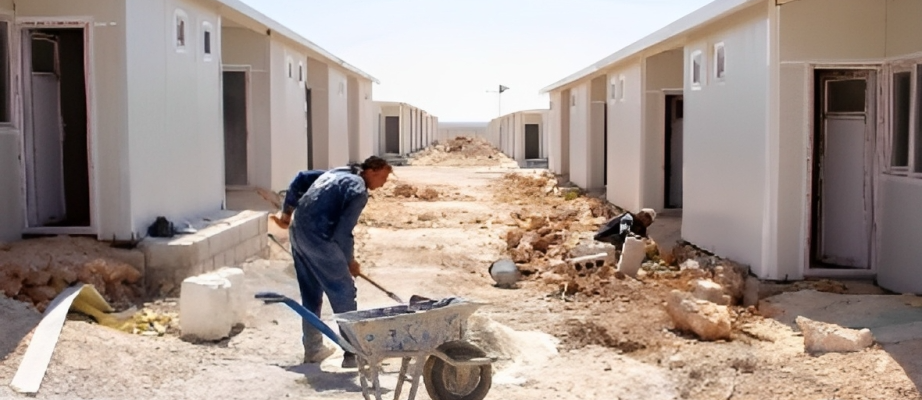Dignified shelter brings a sense of safety to displaced families
Syria | 2023 | CBPF
North-west Syria. For Feda, a displaced mother in Al Bab, the floods and snow last winter were devastating. It took three days to empty the water from her home and dry her furniture and belongings in the sun.
Displaced Syrian families like Feda’s have raised concerns – as reported in an OCHA Community Voices bulletin – about the cold and damp conditions as well as the lack and space and privacy in camps. For ten years, Feda and her four children have lived in the same tent, far exceeding the six-month lifespan of an emergency shelter.
After over a decade of war, 800,000 people are living in tents in north-west Syria, often in overcrowded conditions. As Feda’s friend Yazi puts it, “Living in a tent is like living on the street. If there is rain outside, there is rain inside as well.”
Shelter needs make up the bulk of winter and flood preparedness response in north-west Syria. In 2022, over half the funding requirement was dedicated to shelter and basic household terms, for 2 million people. And to prepare for winter, people needed clothes, blankets, ground insulation and stoves are needed for safety, comfort and dignity – and to reduce the risk of fire from people gathering closely for warmth.
In March 2022, the humanitarian community launched the Action Plan for Dignified Shelter and Decent Living with the aim of replacing nearly all tents in the north-west. The plan made a case for the urgent need for dignified shelters, noting their value for money given its privacy, durability and structural integrity for harsh winter conditions compared with tents. The Syria Cross-border Humanitarian Fund (SCHF) funded the action plan.
Feda and Yazi were among the families who benefitted from the initiative. They and the children moved into one of 400 new buildings in Al Braziyah Al Jadaad camp, built by local organization BINAA with support from the SCHF.
“I felt such relief. There is no mud or dirt, and it did not feel cold. It feels like a home,” Feda said. Each housing unit has a sturdy door, lighting, a sink with water and individual toilets. “I can finally put my head on a pillow and sleep,” said Yazi. She added that feelings of “privacy and security” are what she most appreciated at the new housing.
Other challenges remain for the two women and their children. Food, health care and job opportunities are absent from the new camp so far. The closest health center is five kilometres away, and the affordable market where they prefer to buy bread is even further.
But with support from the Syria Cross-Border Humanitarian Fund, local NGOs like Binaa are on the front-lines of responding to people’s humanitarian needs. In 2022, the Fund allocated 42 per cent of its total allocation – some 59.2 million dollars – directly to local organizations.
More information on the Syria Cross Border Humanitarian Fund:
OCHA – POOLED FUNDS DATA HUB – By Country (unocha.org)
https://www.unocha.org/syria
